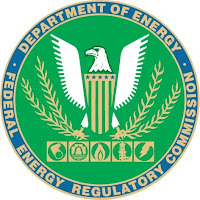 |
| NRC Chairman Kristine L. Svinicki and Commissioner Jeff Baran. NRC photo from 2017 Regulatory Information Conference |
Early this year, Nuclear Engineering International Magazine suggested that I write an article about the future of nuclear energy under the Trump administration. (The magazine is based in Britain.)
This level of prognostication felt a little above my pay grade!
However, I managed it, because I worked with an excellent co-author, Dr. Gilbert Brown. Brown is emeritus professor/ director of the nuclear engineering program at University of Massachusetts, Lowell. He is active in nuclear policy and was a Foster Fellow in the U.S. State Department. Together, Brown and I wrote the article: Nuclear Power in the U.S.A. It appeared in the March issue of the magazine.
I call the article "prognostication" because it was published in the March issue of Nuclear Engineering International, and written in February. A lot of things were in flux at that point. To quote the description of the article in the magazine itself:
President Donald Trump’s first few weeks in office have been a whirlwind of activity. When it comes to nuclear power, there has been some positive momentum with key industry appointments and initiatives for advanced reactors. What might the future hold? By Meredith Angwin and Dr. Gilbert Brown.
Why this article is different
 |
| Doctor Gilbert Brown |
But many nuclear people are somewhat ignorant of FERC, the Federal Energy Regulatory Commission, which is the commission that oversees the grid as a whole.
Dr. Brown and I covered the effects of the vacancies at FERC. We felt we needed to expand our article past the "usual suspects." FERC has so many vacancies on its board right now that it can't hold important meetings or make certain types of rulings.
I think you will enjoy reading our article about nuclear under Trump. When I linked to it on Facebook, a very knowledgable man commented that it was a GREAT high-level summary article, and more such articles will be required in the future.
-------------
Endnotes about FERC:
In late March, long after we had finished the article, the Washington Examiner looked at possible FERC appointments in an article titled The Politics of Fixing FERC.
Much of that article has an inside-baseball feel to it. Read it if you choose, but at any event, I think the title of the article ("Fixing FERC") is an important statement. In my opinion, FERC has been fast-and-free with its mandate, encountering little oversight and almost no press coverage. Most of FERC's actions have been either neutral or not-good for nuclear.
For example, I keep meaning to write about FERC 1000, but I am every time I get ready to dive into that deep deep sinkhole, I remember that I wrote a book and I should spend my time publicizing it. If you want to know more about recent FERC actions, I suggest reading NESCOE's brief in its lawsuit against FERC: the suit is about FERC 1000. Start reading the brief on page 4.
NESCOE is an association of New England states: New England States Committee on Electricity. This association is made up of representatives appointed by the New England governors. I consider NESCOE to be New England's attempt to defend itself against FERC.
NESCOE is rightly concerned that FERC's policy changes will cause states to be forced to pay for other states requirements for transmission lines--lines built for only for state policy purposes. It is taxation without representation: one state votes in for a state policy, and other states pay for that policy. Before FERC 1000, states only shared the costs for transmission lines that were needed for grid reliability, not for state policy.
Oh heavens. See what I mean? I'm heading down the explaining-FERC sinkhole! Okay! Done with that! I'm climbing out now! I'll be okay! Really...I will!
Endnotes about Nuclear Engineering International Magazine
My most recent blog post based on a Nuclear Engineering International article is Pay for Performance on the U.S. Grid: No help to nuclear

No comments:
Post a Comment